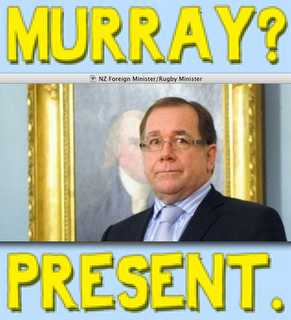
MURRAY WILL BE PRESENT at this week’s Executive Council meeting of the League of Arab States in Cairo.
The Minister of Foreign Affairs, Murray McCully, departed yesterday to bring New Zealand’s perspective to the issues under discussion by Arab leaders. The civil war in Syria; the situation in Libya; on these and other weighty matters, Mr McCully’s insights will undoubtedly be eagerly awaited.
Arab leaders will also be briefed by New Zealand’s Foreign Minister on the many and persuasive arguments for voting to seat his country on the United Nations Security Council.
New Zealand is, after all, one of the many nations contributing to the International Security Assistance Force in Afghanistan where it has expended much blood and treasure in ensuring the Afghan people continue to enjoy the blessings of a modern secular democracy.
The Arab leaders will also be aware that, as the National Party’s foreign affairs spokesperson back in 2003, Mr McCully was politically and personally strongly supportive of the United States invasion of Iraq – an Arab nation with which it was not at war and which constituted no actual threat to its national security.
Arab leaders may wish to question Mr McCully in relation to the strong stands he has taken recently against repressive regimes in the Middle East, and seek to discover whether his enthusiasm for imposing secular democracy by force in Iraq and Afghanistan extends to the Kingdom of Saudi Arabia – which is, of course, neither secular nor democratic.
Arab leaders may find it difficult to reconcile Mr McCully’s loud condemnation of the repressive actions of Bashir Al Assad’s government in Syria, with his comparative silence in response to the suppression of democratic protests in Bahrain.
Questions might also be asked about New Zealand’s enthusiastic endorsement of foreign intervention in the West African state of Mali – where outsiders have attempted to impose their will on the indigenous Tuareg inhabitants of its northern provinces.
Arab leaders may be curious to know why New Zealand is supporting the efforts of the former colonial power in the region, France, to crush militarily the armed Islamicists attacking the indigenous people of Northern Mali, while the armed forces of the world’s largest Muslim country, Indonesia, are permitted to repress the indigenous people of West Papua – a country much closer to Mr McCully’s home – without the slightest hint of a critical diplomatic (let alone military) response from its neighbours.
Liberation by foreign military intervention for the Malians – but not for the West Papuans. Secular democracy for Tunisians, Egyptians, Libyans and Syrians – but not for Saudis or Bahrainis. Personally supportive of the illegal invasion of Iraq, a UN member, in defiance of the UN Charter and without the endorsement of the UN Security Council – but convinced that he is the best person to lobby the League of Arab States on behalf of New Zealand’s bid for a seat on the UN Security Council. These are the confusingly inconsistent and morally contradictory policies being hawked around Cairo by our Foreign Minister.
Wise in the ways of the Western Powers, the Arab leaders will quickly discern in this pompous conservative politician from the picturesque Eastern Bays of Auckland’s North Shore the classic profile of an uncritical apologist for the policies of the US Government.
Programmed by the US State Department, patronised by the Foreign Office in London and firmly wedged under Canberra’s protective wing, Murray McCully has spent his entire time as New Zealand’s Foreign Minister ruthlessly dismantling every vestige of the morally courageous and independent foreign policy of the previous Labour-led Government.
The representative of a country whose former Prime Minister steadfastly refused to follow the Americans, British and Australians into Iraq, and whose former Foreign Minister’s movements on the West Bank were tracked by the gun barrel of an Israeli tank, could be well placed to persuade Arab leaders that this little nation has something to contribute to their cause.
Unfortunately, the representative in question is a man almost entirely lacking in the intellectual and diplomatic subtlety required to leave any lasting or favourable impression on the leaders of the Middle East.
What’s the bet that upon being awakened by the muezzins’ call to prayer from the minarets of Cairo, Murray McCully’s first instinct is to complain about the noise.






Why would the Arab leaders have a problem with McCully’s views when they largely reflect their own position on many matters. It isn’t as if they were jumping up and down about Bahrain or are hanging on about democratic rights in Saudi Arabia. As for Mali I think most of them would be supportive of removing a threat from militant Islam which threatened the entire region.
Comments are closed.